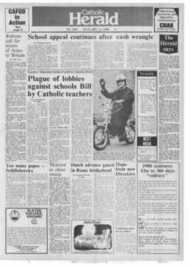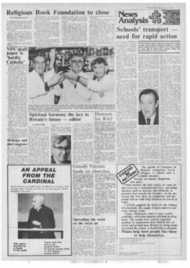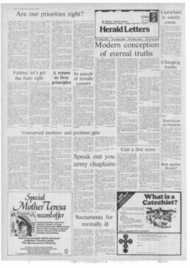Page 7, 11th January 1980
Page 7

Report an error
Noticed an error on this page?If you've noticed an error in this article please click here to report it.
Tags
Share
Related articles
Dutch Warned Of 'parallel Clergy'
Dutch Synod Members In Vatican Meeting
Hushed Dutch Synod Still Stays Sweet
Bold New Initiative As Dutch Bishops Are Called To Rome
Problems Remain As Synod Ends
Uphill task for Pope in Dutch unity bid
Desmond O'Grady sets the scene to the visit by the Dutch bishops to the Vatican
POPE John Paul faces perhaps his most difficult test with the Synod of Dutch bishops which begins in the Vatican on Monday.
Presumably John Paul wants unity within the Dutch Church but it will be a difficult task among the .seven Dutch bishops as one, Johannes Gijsen of Roermond, is an archconservative often accused of having little taste for dialogue.
But even if John Paul does unify the bishops, many Dutch Catholics seem disinclined to heed a Synod in which they are not represented.
The Vatican Council which concluded in 1965 changed the Dutch church from one of the most traditional to probably the most liberal.
Until 1850. Dutch Catholics were a persecuted minority in a Protestant country which saw Catholicism as the religion of its previous oppressors, the Spaniards.
Prior to 1850, as no diocesan bishops were accepted by the government (there were apostolic administrators), Dutch Catholics used to say "Our only bishop is the Pope".
When Catholics' civil rights were recognised after 1850, to a large extent they remained a separated community.
In smaller towns, Catholics frequented only Catholic shops. There were Catholics schools, Catholic dailies and, in time, Catholic radio programmes — and Catholics turned off the radio before Socialist broadcasts began. There was a cradle-tograve Catholic social system and it was believed the Pope was patron of the Catholic Peoples' Party.
The Protestants. the Socialists and other elements of Dutch society likewise had their own well-organised ghettoes.
However, all elements of Dutch society were united in opposition to the Nazi occupiers during the second world war.
It was a surprise to Catholics to find themselves fighting alongside Communists, Socialists, Jews and Protestants, and a greater surprise to find they could eat and joke together.
After the war. some Catholic intellectuals argued for continuation of this collaboration. Jan Williebrands, now CardinalArchbishop of Utrecht and Dutch Primate, was one of the first to advocate ecumenism. Some Catholic laymen jointed the Socialist Party.
These liberals claimed that although Catholic associations had once been necessary, they were pointless when Catholics were the largest (33 per cent) practising religious community.
They asked, for instance, why the Church should bother about Catholic hockey clubs.
Nevertheless, the structures and attitudes of Dutch Catholicism were basically unchanged until the Vatican Council began in 1962.
A pointer to this was the Bishops' 1956 pastoral letters warning against Catholic support for the Socialist party.
The Council swept away the fortress mentality. It went far further on the road of abandoning defensiveness than the liberals had hoped.
For many Dutch Catholics, the Council was liberation (from separatism) theology being proclaimed from St Peter's.
The message arrived when Holland's affluence was encouraging groups such as the Provos to experiment new I ifestyles.
It seemed the Age of Aquarius, or the new Jerusalem, lavas on the horizon.
The Dutch bishops showed willingness to heed the laity. Bishops, priests and laity were all represented in the national Pastoral Council which was one aspect of the Dutch Church's enthusiastic response to the Council.
Yet another aspect was preparation of the Dutch Cathechism for adults; formerly Dutch Catholics absorbed
French and German theology but now thea' were producing theology which attracted world-wide interest.•
Rome. however, blew the whistle on the Dutch Church's evolution.
Rome is wary of enthusiasm. Saint making provides a good example. Saints used to be proclaimed at the local level which ensured participation but did not give adequate guarantees against aberrations. Rome centralised the process. ensuring control but reducing interest.
The Dutch bishops' willingness to heed the faithful worried Rome. Here were the bishops transmitting the opinion of the Pastoral Council's that priestly celibacy should be made optional. Paul VI turned that one down. And changes were ordered in the Dutch Catholicism.
(To discredit the Dutch Church it was easy to point to such cases as that of Father Huub Oosterhuis. a Jesuit poet of the Amsterdam university parish who married but continued to celebrate Mass,) The balance of the small episcopal conference (seven members) was altered by the appointment of a conservative bishop, Adrianus Simonis, to Rotterdam and of an archconservative, Johannes Gijsen, to Rocrmond. By Rome decree, the Pastoral Council was downgraded to a Pastoral Consultation. A changed mood was evident this year when it again came out in favour of optional priestly celibacy and Cardinal Williebrands said it was useless to refer this recommendation to Rome.
For the more conservative, Dutch progressives are a minority who obtain disproportionate attention through control of the media.
There arc no exact figures on the allegiances of Dutch Catholics; archconservative groups insist on the Latin Mass and publish a magazine Confromare but their following
is small. The radical groups are also smaller than a decade ago.
Doubtless there is an extremist fringe among the progressives who have grabbed more attention than they deserve. But there also seems to be a substantial body of Dutch Catholics who, without approving excesses, endorse the newstyle Catholicism inspired by the Council.
If the Rome Synod achieves unity among the bishops, therewill still he the task of restoring the soldarity between bishops and the faithful who have higher expectations than before the Council of sharing responsibility.
blog comments powered by Disqus











